An ancient festival that can be traced back over 2,000 years to the death of the poet bureaucrat Qu Yuan (屈原), the Duanwu Festival (端午節) is still an integral part of the childhood memories of many Taiwanese over 30, for as children they would have participated in the folk customs of hanging cattail and Chinese mugwort on the door to ward off evil spirits. Children would be given sachets of fragrant herbs and have Hsiung Huang wine (
While some traditions persist, the Duanwu Festival, also known as Dragon Boat Festival, has developed into a backdrop for a variety of new and innovated activities, centered on the hugely popular dragon boat races that are held in cities and townships all over Taiwan.
Falling on the fifth day of the fifth lunar month, this year's Duanwu Festival will be celebrated next Wednesday. In preparation, hundreds of dragon boat teams have been participating in huge events in Taipei, Kaohsiung and Taipei, as well as small-scale races in Ilan, Taoyuan, Hualien and Chiayi counties, and Hsinchu and Keelung cities.
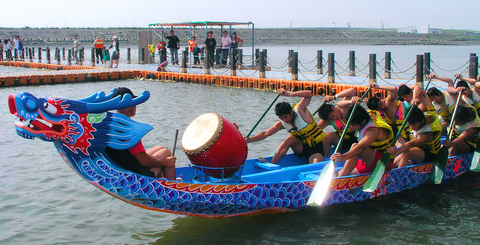
PHOTO: LIU HSIAO-HSIN, TAIPEI TIMES
In Kaohsiung, a staggering 141 teams are competing on the Ai River (愛河), while a total of 122 teams are competing on Tainan's Anping Canal (安平運河). The five-day races in both cities started yesterday. In Kaohsiung, teams will be vying for a purse of NT$2.5 million and the competition is expected to be fierce.
However, the 2006 Taipei City International Dragon Boat Championship (2006年台北國際龍舟錦標賽) organized by Taipei Sports Office (台北市體育處) is expected to draw the largest crowds to visit the six-days of events taking place along the Dachia section (大佳段) of the Keelung River (基隆河) adjacent to Dachia Riverside Park (大佳河濱公園).
This weekend a total of 136 teams began competing in a three day race that will run until late this afternoon.
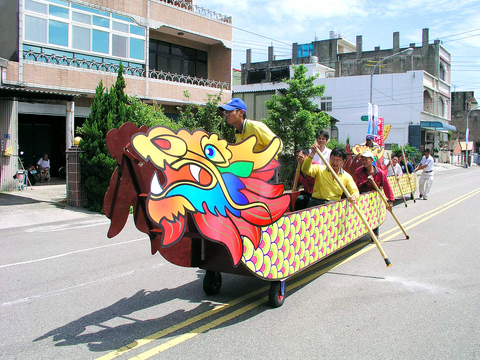
PHOTO: PAN WEN-JEN, TAIPEI TIMES
And on Wednesday, a new marathon race will be held that will severely test contestants' physical strength and endurance. Dragon boat races are usually just 500m, but this new marathon item will be 6km and will take racers around 50 minutes to complete. For those who don't want to miss this first edition of the marathon competition, the race will start at the Dachia section of the river around 1pm and finish around 2pm at the Zhoumei Wharf (洲美碼頭).
In the competition, broadly divided into competitive and social, the Men's Open is the most competitive, with many semi-professional teams from Japan, Malaysia, Hong Kong, South Africa and Philippines, as well as local top seeded local competitors and teams of foreign residents.
Not all the teams have their eye on victory. Many race just for the fun of it. For the Hello Taipei team made up of foreign workers from Southeast Asian countries, the race is more of a holiday escape from their construction jobs. "It's the second time we have organized a dragon boat team for these races. We have been practicing for one month now, but since most companies are reluctant to let their workers take a break from work, we can just work with the people who show up. It's really just a way to let foreign workers enjoy some time off and join local activities," Ding Hao-sen (丁浩森) of the Migrant Worker Culture Center (外勞文化中心) said.
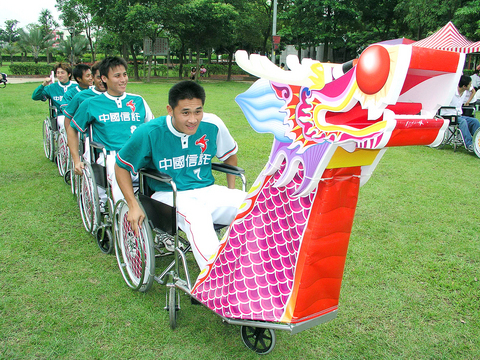
PHOTO: CHEN WEN-CHENG, TAIPEI TIMES
As for the other teams made up of foreign residents such as the Taipei European School team, the annual race has become a much anticipated event to show off their athletic prowess. "We've been participating in the race for five years now. Parents of our students, teachers and school directors all look forward to this time of the year for a good race," Chan Li-wen (
A highlight of the competition will be in the Organization Division which features the long rivalry between the Taipei City Police Department (台北市政府警察局) and Taipei City Fire Depart-ment (台北市政府消防局). A champion for the past 20 years, the fire department team lost the race to the police squad for the first time last year and vows to win back the victory this weekend. As of press time, it was in a strong position and the final results will be decided today.
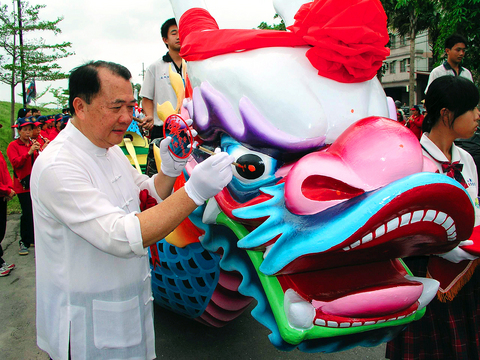
PHOTO: CHANG CHIH-HSIUNG, TAIPEI TIMES
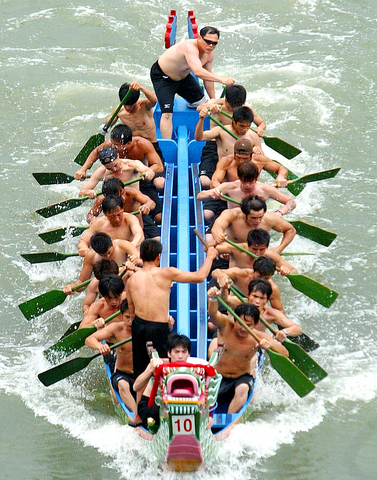
PHOTO: CHANG CHUNG-YI, TAIPEI TIMES
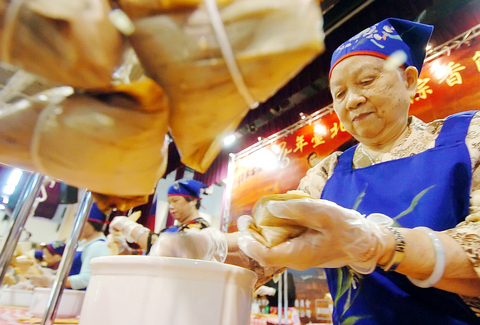
PHOTO: CHEN RUNG-FENG, TAIPEI TIMES
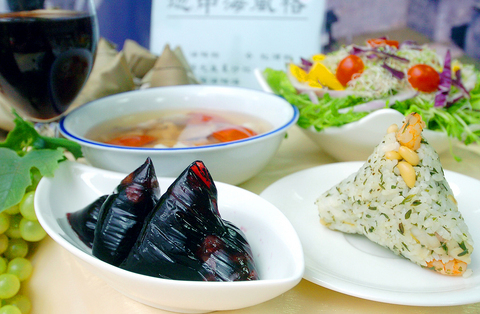
PHOTO: WANG YI-SUNG, TAIPEI TIMES

June 2 to June 8 Taiwan’s woodcutters believe that if they see even one speck of red in their cooked rice, no matter how small, an accident is going to happen. Peng Chin-tian (彭錦田) swears that this has proven to be true at every stop during his decades-long career in the logging industry. Along with mining, timber harvesting was once considered the most dangerous profession in Taiwan. Not only were mishaps common during all stages of processing, it was difficult to transport the injured to get medical treatment. Many died during the arduous journey. Peng recounts some of his accidents in

“Why does Taiwan identity decline?”a group of researchers lead by University of Nevada political scientist Austin Wang (王宏恩) asked in a recent paper. After all, it is not difficult to explain the rise in Taiwanese identity after the early 1990s. But no model predicted its decline during the 2016-2018 period, they say. After testing various alternative explanations, Wang et al argue that the fall-off in Taiwanese identity during that period is related to voter hedging based on the performance of the Democratic Progressive Party (DPP). Since the DPP is perceived as the guardian of Taiwan identity, when it performs well,

A short walk beneath the dense Amazon canopy, the forest abruptly opens up. Fallen logs are rotting, the trees grow sparser and the temperature rises in places sunlight hits the ground. This is what 24 years of severe drought looks like in the world’s largest rainforest. But this patch of degraded forest, about the size of a soccer field, is a scientific experiment. Launched in 2000 by Brazilian and British scientists, Esecaflor — short for “Forest Drought Study Project” in Portuguese — set out to simulate a future in which the changing climate could deplete the Amazon of rainfall. It is

The Taiwan People’s Party (TPP) on May 18 held a rally in Taichung to mark the anniversary of President William Lai’s (賴清德) inauguration on May 20. The title of the rally could be loosely translated to “May 18 recall fraudulent goods” (518退貨ㄌㄨㄚˋ!). Unlike in English, where the terms are the same, “recall” (退貨) in this context refers to product recalls due to damaged, defective or fraudulent merchandise, not the political recalls (罷免) currently dominating the headlines. I attended the rally to determine if the impression was correct that the TPP under party Chairman Huang Kuo-Chang (黃國昌) had little of a